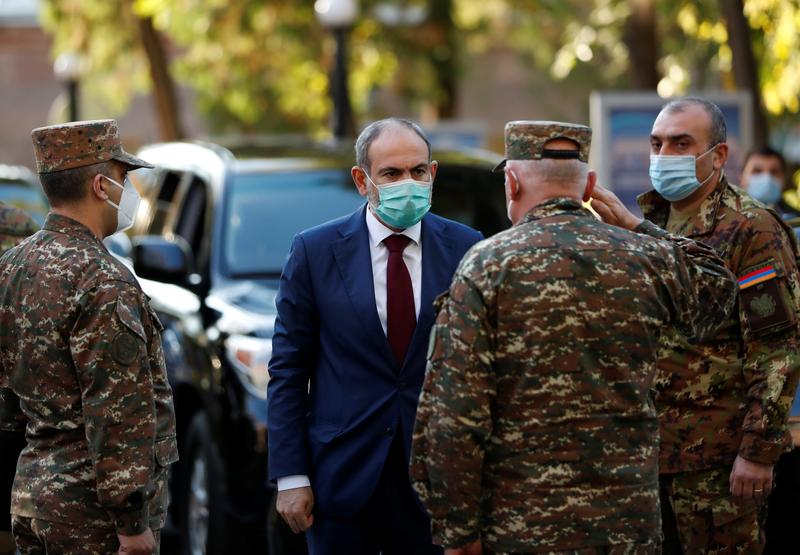New clashes in Nagorno-Karabakh after Washington talks

BAKU/MOSCOW (Reuters) – New clashes broke out between Azerbaijan and ethnic Armenian forces over Nagorno-Karabakh a day after talks in Washington to try to end the deadliest fighting in the enclave in more than a quarter of a century.
Azerbaijan’s defence ministry reported fighting in and around Nagorno-Karabakh, a mountainous part of Azerbaijan populated and controlled by ethnic Armenians.
It said the areas of Lachin and Gubadli had come under rocket and artillery fire from inside Armenian terrritory.
In Nagorno-Karabakh, local officials accused Azerbaijan’s forces of firing Smerch missiles into residential buildings in Stepanakert, the largest city in the region, which Baku denied.
U.S. Secretary of State Mike Pompeo had met separately with the foreign ministers of Azerbaijan and Armenia on Friday in a new attempt to end nearly a month of bloodshed that Russian President Vladimir Putin said may have killed 5,000 people.
The collapse of two Russia-brokered ceasefires had already dimmed the prospect of a quick end to fighting that broke out on Sept. 27 over Nagorno-Karabakh.
The defence ministry of Nagorno-Karabakh said the total number of Armenians killed in the weeks of fighting had risen by 36 to 963, the Russian news agency Interfax reported.
Azerbaijan said a 13-year-old Russian boy died on Saturday after being wounded in a rocket attack on the city of Ganja on Oct 17. Azerbaijan says 65 Azeri civilians have been killed and 298 wounded, but has not disclosed its military casualties.
Azeri forces say they have made territorial gains, including full control over the border with Iran, which Armenia denies. Nagorno-Karabakh’s ethnic Armenian administration says its forces have repulsed attacks.
ACCUSATIONS ON BOTH SIDES
President Ilham Aliyev told French newspaper Le Figaro that Azerbaijan was ready to sit down for negotiations but blamed Armenia’s actions for the continued hostilities.
“We are ready to stop even today,” Aliyev was quoted as saying. “But, unfortunately, Armenia grossly violated the ceasefire …If they don’t stop, we will go to the end with the aim of liberating all the occupied territories.”
Armenia’s foreign ministry said Azerbaijan’s aggression posed an existential threat to the security of the region.
Slideshow ( 4 images )
U.S. President Donald Trump said “good progress” was being made on the issue but did not elaborate and declined to say if he had spoken with the leaders of either country.
Asked how his talks with Pompeo went, Armenian Foreign Minister Zohrab Mnatsakanyan told reporters “very good” as he exited the U.S. State Department, and added that work on a ceasefire would continue.
World powers want to prevent a wider war that draws in Turkey, which has voiced strong support for Azerbaijan, and Russia, which has a defence pact with Armenia.
Slideshow ( 4 images )
Differences over the conflict have further strained relations between Ankara and its NATO allies, with Pompeo accusing Turkey of fuelling the conflict by arming the Azeri side. Ankara denies it has inflamed the conflict.
Pompeo had said ahead of Friday’s talks that he hoped the “right path forward” could be found.
But Armenian Prime Minister Nikol Pashinyan said he saw no diplomatic resolution of the conflict at this stage, and Aliyev has described the prospects of a peace settlement as “very remote”.
About 30,000 people were killed in a 1991-94 war over Nagorno-Karabakh. Armenians regard the enclave as part of their historic homeland; Azeris consider it illegally occupied land that must be returned to their control.






